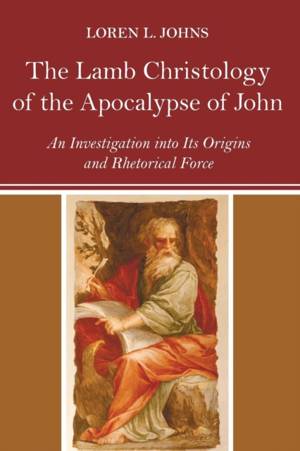
- Retrait gratuit dans votre magasin Club
- 7.000.000 titres dans notre catalogue
- Payer en toute sécurité
- Toujours un magasin près de chez vous
- Retrait gratuit dans votre magasin Club
- 7.000.0000 titres dans notre catalogue
- Payer en toute sécurité
- Toujours un magasin près de chez vous
54,45 €
+ 108 points
Format
Description
""Johns asserts that the Lamb symbol in Revelation underscores the gospel message that the way of Jesus lies at the heart of biblical salvation. Ethics and saving faith are inextricably linked. In Johns' view, the key to the message of Revelation is found in letting the reversal of imagery from Rev 5 shape our interpretation of the entire book: the conquering Messiah is actually the martyred Lamb, who defeats the powers through suffering love. Johns writes with great clarity. Hence, his argument is accessible to the general reader. This book will be of great value both for specialists and for nonspecialists with an interest in Revelation or in the basis for resistance to the powers that foster violence and injustice in our world."" --Ted Grimsrud, Professor of Theology and Peace Studies, Eastern Mennonite University ""For many modern readers of the book of Revelation, the visions contained in this book raise serious questions. Revelation is a book filled with warfare, bloodshed, judgment, and divinely sanctioned suffering of humanity. How can a modern Christian reader claim as Scripture a book filled with such violence? Johns' book is the most significant attempt to date to wrestle with the Lamb Christology of Revelation as it relates to the question of how we should treat the violent nature of Revelation's visions. In doing so, he has rightly shown that the author of Revelation offers a significant reversal of our understanding of power and overcoming, both for first-century readers and today. Anyone who wants to engage the Lamb imagery in Revelation and the question of how we understand its violent imagery must interact with Johns' work."" --David Mathewson, Associate Professor of New Testament, Denver Seminary ""Most scholars tend to rely on the gospels and the letters of Paul to inform their Christology--with only a sideways glance to the Revelation of John. The apocalyptic Christ is seen, therefore, as an oddity, an ancillary view that must be domesticated to the controlling messianic images of the rest of the New Testament. Johns places the Lamb Christology of the Apocalypse of John in the center of our theological focus, because the one who is worthy of worship is worthy of imitation. This book is brilliant, engaging, honest, and well written."" --Rodney Reeves, Courts Redford Professor of Biblical Studies, Southwest Baptist University ""Johns persuasively argues that Revelation's Lamb Christology has ethical implications for Christians' nonviolent resistance. Strengths of the book include Johns' attention to exegetical detail, his thorough exploration of the background of the Lamb imagery, his balanced consideration of the merits and problems of seeing various Old Testament traditions as antecedents for the Lamb Christology, and his critical engagement with current scholarship. The book makes a fine contribution to New Testament scholarship on the Apocalypse, and should be read by anyone interested in the ethical implications of the book's violent imagery."" -- Sheila Klassen-Wiebe, Associate Professor of New Testament, Canadian Mennonite University ""An important contribution to the study of the Apocalypse!"" --Tobias Nicklas, Professor of New Testament, University of Regensburg ""Multitudes of Christians today assume that the book of Revelation gives us a sneak preview of a future in which Jesus returns to ruthlessly slaughter all his enemies. I once held this view, but I always struggled to reconcile the vicious 'end time' Jesus with the enemy-loving, nonviolent Jesus of the Gospels. Loren Johns' work, The Lamb Christology of the Apocalypse of John, was one of the most influential books in opening my eyes not only to the symbolic nature of the apocalyptic genre, but also to the ingenious way John subverts typically violent apocalyptic symbols, transforming them into symbols of self-sacrificial love. For all who are confused by the last book of the Bible, and especially for those who think it depicts
Spécifications
Parties prenantes
- Auteur(s) :
- Editeur:
Contenu
- Nombre de pages :
- 306
- Langue:
- Anglais
Caractéristiques
- EAN:
- 9781625646972
- Date de parution :
- 10-11-14
- Format:
- Livre broché
- Format numérique:
- Trade paperback (VS)
- Dimensions :
- 150 mm x 226 mm
- Poids :
- 376 g

Les avis
Nous publions uniquement les avis qui respectent les conditions requises. Consultez nos conditions pour les avis.






